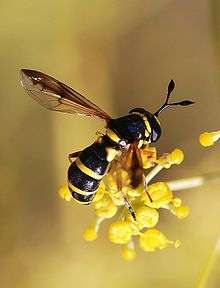Ceriana vespiformis
| Ceriana vespiformis | |
|---|---|
 | |
| Scientific classification | |
| Kingdom: | Animalia |
| Phylum: | Arthropoda |
| Class: | Insecta |
| Order: | Diptera |
| Family: | Syrphidae |
| Genus: | Ceriana |
| Species: | C. vespiformis |
| Binomial name | |
| Ceriana vespiformis (Latreille, 1804) | |
| Synonyms | |
| |
Ceriana vespiformis is a species of hoverfly. It is a typical wasp mimic, is 10–11 mm long, and has very long antennae for a hoverfly.
Biology
C. vespiformis is reported from mature oak forest and from Mediterranean scrub, where adults visit flowers to feed on nectar. Larvae are found in sap runs on White Mulberry (Morus alba). Adult are seen in Southern Europe from late May to September.[1]
Distribution
This species range is mainly Mediterranean (Southern Europe and North Africa). Specimens have been found in Spain, Portugal, France, Italy, Albania, Greece, Romania, Turkey, Lebanon, Israel and parts of North African. 2 specimens have been found in the Netherlands.[1]
References
- 1 2 M. Reemer, B. van Aartsen (2001). "Ceriana vespiformis, een nieuwe zweefvlieg voor de Nederlandse fauna (Diptera: Syrphidae)" (PDF). Nederlandse Faunistische Mededelingen (in Dutch and English). 11 (1): 133–136. ISSN 0169-2453. Retrieved 2009-01-09.
This article is issued from Wikipedia - version of the 4/26/2016. The text is available under the Creative Commons Attribution/Share Alike but additional terms may apply for the media files.